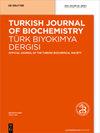奥地利青蒿精油的化学成分研究。在伊朗野生生长
IF 0.7
4区 生物学
Q4 BIOCHEMISTRY & MOLECULAR BIOLOGY
Turkish Journal of Biochemistry-turk Biyokimya Dergisi
Pub Date : 2014-01-01
DOI:10.5505/TJB.2014.28199
引用次数: 7
摘要
目的:蒿属(菊科)由分布在世界北温带地区的多年生常见芳香草本植物约400种组成。奥地利青蒿。是该属中最常见的一种,分布于中欧到西伯利亚、土耳其和伊朗。在伊朗,这种植物原产于东阿塞拜疆和阿达比尔省。本文研究了奥地利青蒿地上部分的挥发油成分及其化感作用。方法:采用clevenger型装置,采用加氢蒸馏法提取挥发油。脱水后,采用气相色谱和气相色谱-质谱法对精油进行分析。结果:结果表明,在莪术油的51种成分中,主要成分为樟脑(15.88%)、1,8-桉叶脑(10.75%)、樟烯(3.53%)和-茴香醇(3.03%)。该植物精油具有显著的抗菌核活性和植物毒性。结论:本研究结果表明,采自伊朗西北部、阿达比勒和土耳其的奥地利南芥精油的主要成分具有高度的相似性。因此,这两个样本可能代表相同的化学型。另一方面本文章由计算机程序翻译,如有差异,请以英文原文为准。
Chemical composition of the essential oil of Artemisia austriaca JACQ. growing wild in Iran
Objective: The genus Artemisia (Asteraceae) comprises approximately 400 species of commonly perennial and fragrant herbs distributed in the northern temperate region of the world. Artemisia austriaca JACQ. is one of the most common species of the genus distributed from central Europe to Siberia, Turkey, and Iran. In Iran, the plant is indigenous to East Azerbaijan and Ardabil province. In the present study, the essential oil composition of the aerial part of Artemisia austriaca and some allelopathic potential of the oil were studied. Methods: The essential oil of the plant was obtained by hydrodistillation using a clevenger type apparatus. After dehydratation, the essential oil was analyzed by GC and GC-MS. Results: The results showed that the camphor (15.88%), 1,8-cineole (10.75%), camphene (3.53%) and beta-fenchyl alcohol (3.03%) were the main components among 51 constituents characterized in the oil. The plant essential oil showed significant anti-sclerotinia and phytotoxic activity. Conclusion: Our findings indicated that there is a high level similarity between the major compound of essential oil of A. austriaca samples collected from northwest of Iran, Ardabil, and Turkey. Accordingly, the two samples may represent the same chemotype. On the other
求助全文
通过发布文献求助,成功后即可免费获取论文全文。
去求助
来源期刊
CiteScore
1.20
自引率
0.00%
发文量
0
审稿时长
6-12 weeks
期刊介绍:
Turkish Journal of Biochemistry (TJB), official journal of Turkish Biochemical Society, is issued electronically every 2 months. The main aim of the journal is to support the research and publishing culture by ensuring that every published manuscript has an added value and thus providing international acceptance of the “readability” of the manuscripts published in the journal.

 求助内容:
求助内容: 应助结果提醒方式:
应助结果提醒方式:


